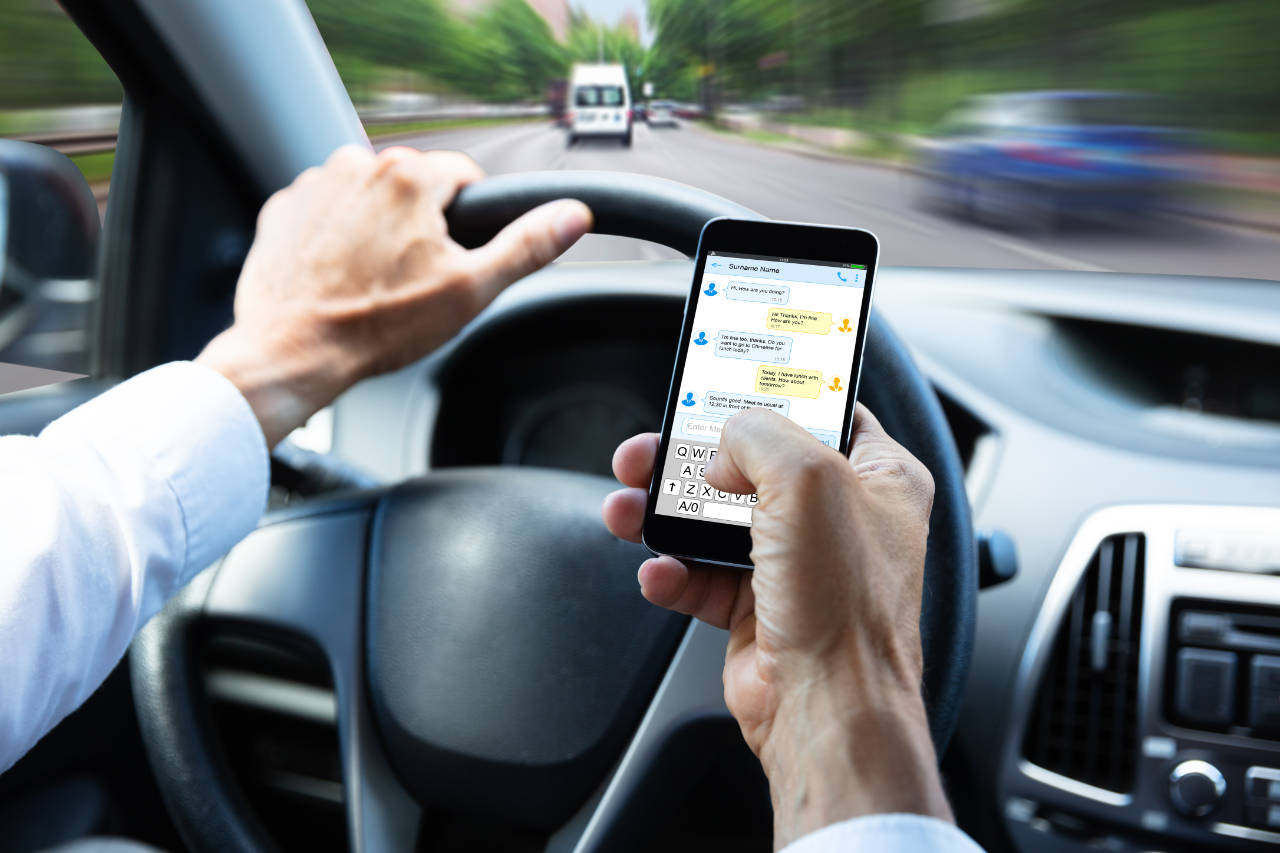
Despite publicity about police clamping down on mobile device use in vehicles, many of us still seem to be unclear with regards to the law and its application. According to research by the Department of Transport, 14% of motorists think that using a mobile phone while driving does not distract them.
Employees driving company vehicles might have questions about how safe it is to use mobile devices while driving. Questions may include:
- Can you use a hands-free phone when driving?
- Is it illegal to wear headphones when driving in the UK?
- What is a hands-free mobile phone?
We’ve rounded up the latest practical advice for mobile phone use while driving, and the law relating to using mobile devices in vehicles.
All employees who drive on behalf of their employer are required to undergo driver awareness training. Our driver awareness course helps ensure employees can drive safely, cooperate with laws and know how to avoid risks associated with reduced driver awareness.
How mobile phone use while driving affects awareness
Let’s start with the basics. If you are in charge of a vehicle and holding a mobile device in your hand to make a call, or to use any other functionality, then that is an offence and you will be prosecuted if caught. Driving and being in charge of the vehicle includes if you are stopped at a red light, or stuck in a jam with your engine running. It is therefore still the same offence.
The law also covers ‘communication devices’. It is illegal to interact with any devices, such as tablets, which can be used to communicate via messages, such as emails, texts or social media. This applies even if they are anchored into position using a cradle or similar.
You need only to be seen by the police using a mobile when driving to find yourself facing a minimum of a £200 fine plus six points on your licence – and you could be sent to court at the discretion of the police where the maximum fine is £1,000 for car drivers and £2,500 for bus and goods vehicle drivers can be applied. If this occurs within two years of passing your test, you will lose your licence.
[IMAGE]
Using a mobile phone while driving – ‘hands-free’ status
The law does not prevent the use of a mobile phone which is paired with a hands-free in-car system or a blue tooth device, or housed in a cradle. However, if a driver is considered not to be in proper control of their vehicle because they are using a phone, they commit the offence of ‘not being in proper control’ of their vehicle.
The same law applies to drivers eating at the wheel or even attending to an unhappy baby. The penalties for being judged to be ‘not in proper control’ are a £100 fine and three points for a car driver which rises to £1,000 if it goes to court, or up to £2,500 for a bus or goods vehicle.
The dangers of using a mobile phone while driving
According to Royal Society for the Prevention of Accidents (RoSPA), drivers using phones are four times more likely to crash, injure or kill themselves and other people – and using a hands-free phone does not significantly reduce the risks.
If a driver is involved in any kind of incident, their mobile phone data will be examined. If it was being used at the time or leading up to an incident for any purpose, they could expect to receive a prison sentence if they are found to be at fault.
Outside of the legal impact of this scenario, convicted drivers face significant rises in future insurance premiums and could face disciplinary action under the terms of their employment contract, which could result in dismissal.
When you can use a mobile phone
Please also be aware that the one exemption to using mobile phones while driving is to make a 999 or 112 call, providing it would be unsafe or impractical to stop first. Find out more about using mobile phones while driving and the law with this handy Gov.UK guide.
Employer responsibilities for employees caught using a mobile phone
As an employer, you may be subject to prosecution if you:
- Cause or permit an employee to drive while using a phone without proper control of the vehicle.
- Require employees to make or receive calls when driving.
- Install a phone that results in dangerous driving.
Driving awareness checklist
Here are six things you should consider:
- Don’t use mobile devices when driving or in control of the vehicle, as all the evidence shows that doing so means you are more likely to have an accident as you are distracted during and after a call.
- If an employer accepts that the risk is acceptable, then ensure that the vehicle has an integrated hands-free system or an aftermarket version, and lock your phone in your glove compartment when driving.
- Alternatively, buy a cradle for your phone and consider a Bluetooth earpiece, too – this will improve driver awareness exponentially.
- Even if you have the most sophisticated in-car hands-free system, you are still at risk of prosecution if judged to be ‘not in proper control’ – and if you are involved in an incident, the police will check your data records.
- If you are an employer with company vehicle drivers or even employees who drive their own vehicles on business, make sure that you have a ‘Vehicle Safety and Usage Policy’ or ‘Driving at Work Policy’ and ensure employees are properly trained and informed about how to comply. Employers can use our Driver Assessment plus tool to manage road risk and authorise drivers.
- As an employee or employer, and particularly if you are a high mileage driver, take a driver awareness course such as the Praxis42 Driver Awareness eLearning course, which has lots of helpful hints. It can be purchased and completed online at any time, and costs £25.
All employees who drive on behalf of their employer are required to undergo driver awareness training. Our driver awareness course helps ensure employees can safely drive, cooperate with laws and know how to avoid risks associated with reduced driver awareness.




